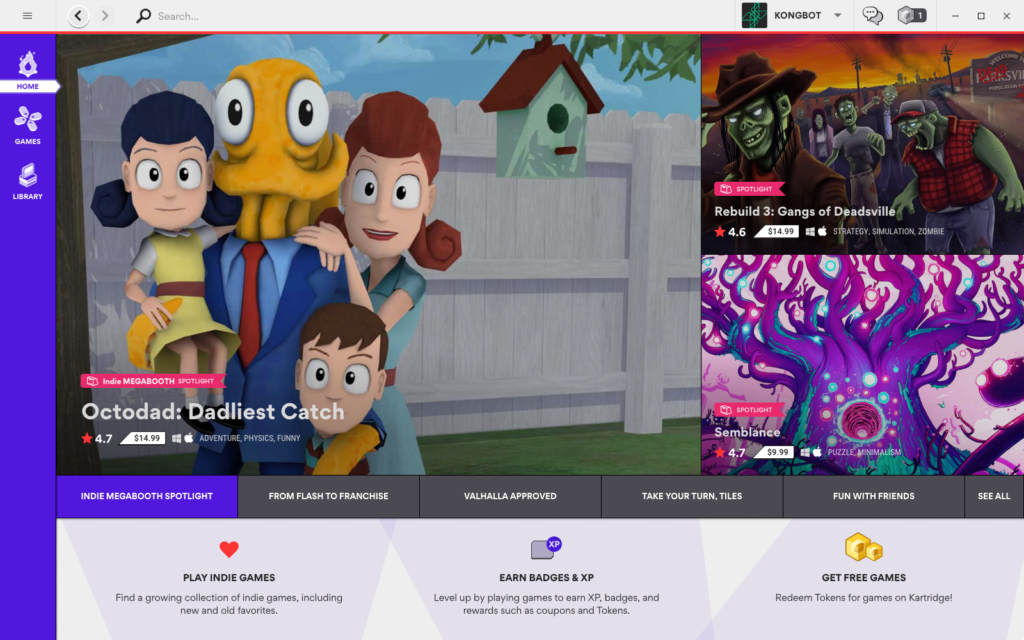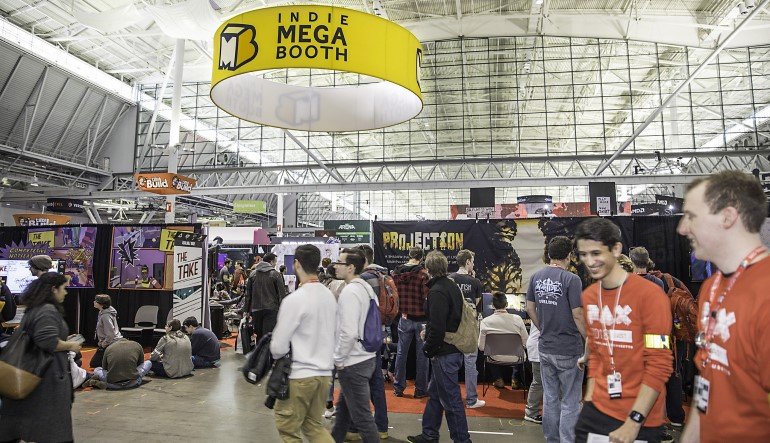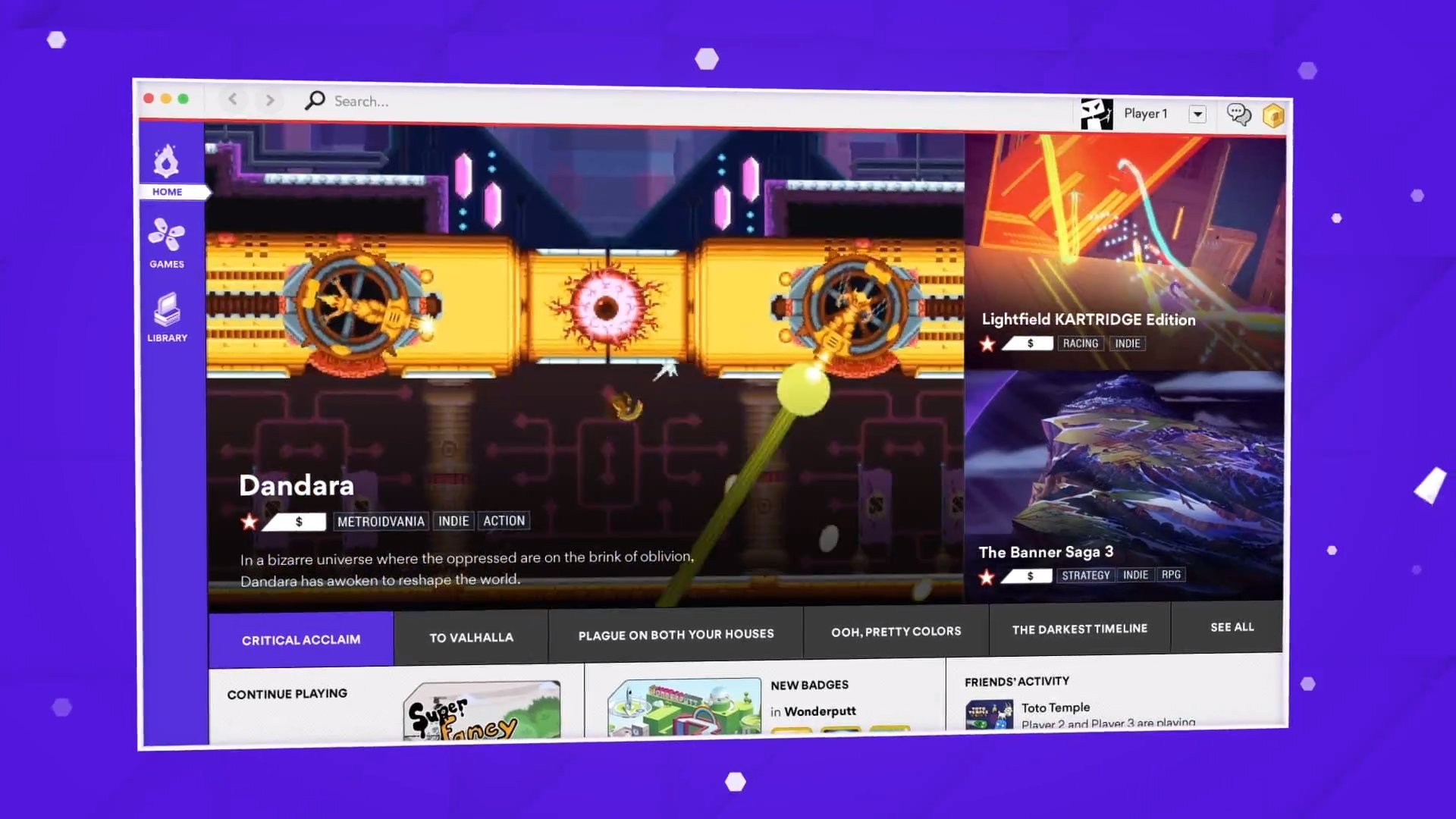
The Indie Megabooth has been a mainstay staple at conventions like PAX since 2012. But founder Kelly Wallick often hears that people don’t remember a PAX before the Megabooth existed. And after a decade of attending PAX conventions, it’s hard for me to remember those days, either. Perhaps it’s because more often than not, the majority of the best games at PAX have a tendency to be in the Megabooth — these are the games that are pushing limits, trying something new.
It’s difficult to believe that there was ever a time when those games didn’t have an organization and a community of fellow indie developers to prop them up at events. But before Wallick founded the Indie Megabooth (IMB), it was a dark, cold, scary time to be an indie dev in a sea of triple-A behemoths. These days, Wallick isn’t just interested in what she can do for developers at an event — she wants devs to thrive after their game finally launches.

As of today, Indie Megabooth has partnered with Kongregate’s indie game platform, Kartridge, to curate a Spotlight of the Megabooth’s celebrated indie alumni. IMB’s alumni community is comprised of 800 developers and these developers stay connected through the IMB Facebook group, as well as the mailing list. But beyond that, there isn’t a whole lot that IMB had been able to do for its alumni until this partnership solidified.
“So now we’re in the phase where it’s like, ‘Okay, if we’re gonna be around …’ we’ve built this really big community,” Wallick said. “Our alumni community is pretty substantial right now and everyone is super positive [and] really friendly. I spent a lot of time and effort building the kind of community that I wanted to spend my time with. I really want to reward people who are doing the slow and steady wins the race sort of idea… [people that] really have a positive vision of what games and technology can be and increasing the diversity of the people who make the games and the people who want to play the games.”
This partnership isn’t going to be IMB offloading the entirety of its developer relationships onto Kongregate (or Kartridge), mind you. It’s all about curation and finding the right fit for the platform at the right time.
“IMB Alumni games on Kartridge will be easily identifiable by an exclusive emblem on their game pages, distinguishing them as a previous IMB showcase selection,” a statement from IMB stated. “IMB’s network is a mix of up-and-coming indie talent and larger indie studios with notoriety; as a result, IMB’s alumni community includes all sorts of genres, experiences and voices that represent a comprehensive and diverse cross-section of the current indie games scene. Players on Kartridge can expect to a high level of quality and ingenuity from developers around the world while exploring the ‘IMB Spotlight’ titles.”
Deals like this don’t happen overnight. Wallick told GameDaily that she’s been so excited about the potential of this deal since DICE 2018, where she first met Kongregate CEO, Emily Greer.
“First off, [Emily is] amazing, she’s super smart, really nice,” Wallick said with a laugh. “I really respect and admire what she’s been doing with Kongregate over the last couple years. I think obviously there are so many platforms and so much stuff that’s coming out now… we were talking to lots of different people about how do we help to solve these issues around discoverability. And when I sat down and I talked with [Kongregate], it was basically like if I were to sit down and make a platform from scratch, they were hitting basically every one of my big checkboxes out of that.
“And so I was like, ‘Oh, yay, somebody is making what I had wanted to create and also they’re doing it in a way that’s really smart, really well thought out.’ I had a million questions and they had really great answers for everything. And then on top of that, the rest of the team and everything, they’re so supportive of the Megabooth and what we do and are just really big fans of the community that we’ve built and the types of games that we carry. And it’s been such a nice partnership with them. We have really good partnerships and relationships with all of our sponsors and all of our partners, ’cause that’s another thing: we don’t want to partner with people who don’t reflect our values… The values and the community building side is so important to me, and so we’re always really careful about who we’re working with.”
The impetus for the partnership with Kongregate was made with IMB alumni in mind, of course, but Wallick was cognizant that if she wanted to keep being excited about going to work every day, she’d need to do something more than what they had been doing. Events weren’t going to move the needle forever. She needed to look to the long-term, not just event to event and con-season to con-season.
“If we’re gonna be around for the long-term, we need to think about how do we make bigger impacts than just being at the events and having the community that we have,” Wallick mused. “How do we really make the whole industry different and how do we make that better and how do we make a difference in the way that we can? And a lot of the stuff that I wanna do is… I kinda want to prove a point. I want to show that it can be done differently so that it gets other people thinking and other companies thinking and bigger studios and bigger companies thinking about yeah, why do we do it this way? Why are we targeting these same audiences? Why are we constantly doing the same thing just because it’s always been done that way?
“You can be creative and you can be different and it can still be rewarding for everybody. And so a lot of stuff for me with that is how do I just stand on the outside and poke everybody and be like, ‘Do it differently.'”
Wallick’s an instigator, that’s for sure. But she has every reason to feel good about that. Between the democratization of game development tools in the industry and Wallick’s efforts to prop up indie developers, indie game developers aren’t toiling alone in obscurity anymore. They have a community to lean on. They have role models to look up to and ask questions of. In fact, some indie devs haven’t been in the industry long enough to know that there was life before the Megabooth.

“It’s kind of hard to get perspective,” Wallick noted. “We’ve been really supported by the community… and I’ve been super grateful for all the advisors and help and everybody’s pitched in to make this successful. So, it’s really nice to hear from people [about] how much [IMB] affected them or how much it’s helped them move into the game industry or the people they’ve met or the support that they’ve gotten. Sometimes it’s a little overwhelming. I was just like, “Well, I’ll just try [IMB] out and see” — it has become something that’s so influential and important to so many people.
“[IMB is] this staple in the industry. I have a lot of gratitude around the fact that I feel good that we have been doing it in this really positive way and really reflecting [our] principles. And I really hope that that’s affected the industry overall, because I think it’s so important that everybody be working together towards the common good, instead of competing and in-fighting and all that other stuff that I think really hinders other industries (especially entertainment industries). And it’s just nice to see that, to be able to make that kind of difference in something that’s really influential to a lot of people. It’s humbling.”
Wallick’s humility might be the result of her own origin story. Before IMB, before games in general, Wallick was a chemist. (And yes, that totally caught me by surprise, too.) She left her job at a nanotechnology firm in Pennsylvania to work at Infrared5 as an administrative assistant. She was soon managing projects and taking a good look at the industry’s underpinnings. Before long, Wallick decided to volunteer with Fire Hose Games at PAX West, back when all of the indies were shuffled upstairs to the 6th floor (and no one knew they were there). Wallick’s first thought was to help these indies do better. And, well, that was how the Megabooth was born. (Mostly.)
“When I first started going to [game dev] meetups in Boston, I asked a million people, everyone that would talk to me, tons of questions,” Wallick said. “I was super curious and everyone was super nice and very supportive and willing to explain to me what was going on and work with me to build this semi-crazy idea. And I’m always very grateful for that, and I think it really says a lot about the types of people that make these kinds of games.
“A lot of them are like, ‘I used to be a physicist or I used to be a musician or I used to be an artist.’ I feel like it’s all people that are sort of like me, where they have this interest in all of these different aspects and they’re technical and creative and they didn’t really fit anywhere else. And so they just drop out of all of that and end up in indie games.”
This unique community has far more resources by being in touch with one another with IMB’s alumni network, but there wasn’t much more Wallick and IMB could do for the alumni who’d launched their games, other than signal boost where they could. It wasn’t enough for the alumni and it certainly wasn’t enough for IMB. Wallick wants more visibility “so that we can get our name out there and can help get more games discovered.”
That’s where Kartridge comes in.

“This partnership with Kongregate helps to introduce us to a broader consumer-facing audience and Kongregate’s audience is kind of the same thing,” Wallick noted. “They’re really nice, they’re really supportive of Kongregate, incredibly high volumes of flash games and content coming in, so they have a lot of literacy around how that works. The fans really respect how their curation and how their site is set up and everything. So for us, it’s exciting ’cause it’s like we get to start outwardly talking to fans of video games and fans of this kind of content and say, ‘Hey, we’re here, this is who we are, this is what we do. If you want to find content that is like this and you think games aren’t made for you or you can’t really find or discover the kind of stuff that you like because it’s too messy or it feels really gate-kept or whatever, here it is.'”
The curation deal on Kartridge isn’t the only thing that IMB has had up its sleeve and it certainly isn’t the only priority. Visibility in the marketplace isn’t just about being seen at home — it’s about being a recognizable entity elsewhere in the world, too. Wallick envisions a global reach for IMB in order to help devs from around the world. IMB has started off by dipping in to help other indie-focused events, as well.
“We helped with organizing BitSummit [in Japan],” Wallick said. “We’re not formally working with them in the same way we were over the last couple years, but as they were getting it started, advising and helping them to build that up and learning more about the Japanese gaming and indie scene. [BitSummit] then led to doing more work in China. So we’ve worked with an event called WePlay in Shanghai over the last two years.
“We’ve been expanding into global opportunities, depending on where folks are looking for content as well, so that helps to support developers getting into markets that they might not be able to typically get into or set them up with meetings with people that they can trust and they can talk to about getting into these regions that they’re not really super familiar with.”
Wallick’s natural tendencies as a catalyst for change had IMB running its own Megashow events, which are standalone events. Their first was in Atlanta two summers ago. It’s her dream to spin those up again and “target underserved communities and underrepresented developers and cities and locations throughout the US.”
IMB has grown from the notion of “hey, we little guys need to stick together” into an industry necessity. Without IMB, many indies might not have made it as far as they have. Having indie games demoed in high-traffic areas at PAX conventions and GDC can be the difference between receiving that extra support from fans and consumers (which then funds the game’s development efforts) and falling into obscurity without much chance at success. Wallick isn’t satisfied with being event-only, nor is she resting on her laurels now that the partnership with Kongregate has finally come to fruition. With a number of irons in the fire, so to speak, Wallick is primed to continue to instigate change and evolution within the indie community in her own way.
“2018 was a lot of the foundation-building of [looking at] how many people do we actually need on the team to execute the stuff that I really want to do,” Wallick said. “What are the partners that we want to have and what do we really want this to look like in the future? And 2018 was a lot of building that foundation and 2019 is going to be a lot of announcing things and executing on the stuff that we’ve been working on the last year or two.”
 GameDaily.biz © 2026 | All Rights Reserved.
GameDaily.biz © 2026 | All Rights Reserved.